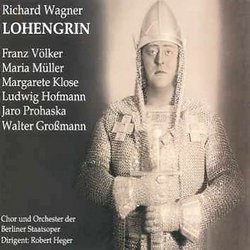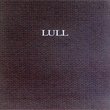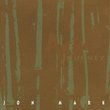| All Artists: Jaro Prohaska, Walter Grossmann, Richard [Classical] Wagner, Artur Rother, Robert Heger, Staatskapelle Berlin, Maria Muller, Franz Völker Title: Wagner: Lohengrin Members Wishing: 1 Total Copies: 0 Label: Preiser Records Release Date: 9/30/1992 Genre: Classical Style: Opera & Classical Vocal Number of Discs: 3 SwapaCD Credits: 3 UPC: 717281900430 |
Search - Jaro Prohaska, Walter Grossmann, Richard [Classical] Wagner :: Wagner: Lohengrin
 | Jaro Prohaska, Walter Grossmann, Richard [Classical] Wagner Wagner: Lohengrin Genre: Classical
|
Larger Image |
CD DetailsSimilar CDs
|
CD ReviewsAlan Blyth's Review in Gramophone Record Collector | Mons, Belgium | 03/27/2006 (5 out of 5 stars) "In spite of its varying drawbacks, this is an absolutely essential document of Wagnerian interpretation as it was in the middle of this century and is no longer heard today. The tradition stems from long familiarity of the conductor and singers with the opera in hand and with each other's performance, so that a unified approach can be felt on all sides. Only in Kempe's noted version on EMI (2/88) have I felt so strongly the main attributes of Lohengrin: here Robert Heger, the very epitome of the Kapellmeister manner at its best, gives to the many passages of formal utterance a grandeur and intensity so often missing in studio performances, culminating in a magnificent outpouring at the final greeting to Elsa in Act 2. The other aspect of the work, its unforced lyricism, is marvellously expounded by the Berlin State Opera strings of the day, one or two moments of faulty ensemble apart, through their seamless legato and ethereal tone, evincing the very essence of Lohengrin's knightly origins and Elsa's pure and warm soul. But then these roles are expounded by probably their two finest interpreters in the whole history of the opera. The partnership of Muller and Volker dates back a few years to the Bayreuth Festival-we have extracts of their portrayals there of these roles in 1936 (but studio-made) on Telefunken (available on a variety of labels on LP). Volker ideally combines the lyrical and the heroic in his singing, phrases with authority, albeit with a certain freedom where note values are concerned and puts other contenders in the shade, even though by 1942 the voice wasn't quite as pliant or firm as it had been six or seven years earlier. His portrayal is at its most eloquent in the Narration and Farewell, with a nice use of piano tone. Muller is even better, outdoing even Kempe's lovely Grummer. The passage beginning ''Du armste kannst wohl nie ermessen'' in her Act 2 colloquy with the seemingly obsequious Ortrud is sung freely, as Wagner suggests, and with the utmost care over shaping each phrase. This attention to detail only enhances the beauty and warmth of the voice itself, the ideal instrument for the part. Being a notable actress, she is just as compelling when the doubts have been sown: this Elsa, after singing a glorious, apparently contented Third Act duet with Volker's sovereign Lohengrin, becomes appropriately disturbed and hysterical. Both these artists tackle their roles through the text. Even more forceful with words is Klose, a famous Ortrud heard here in her absolute prime as she sweeps all before her in Act 2. This is a portrayal of malevolence on a grand scale. Prohaska her Telramund, has an equal command of the full meaning of his role, but is here caught in sadly frayed voice; even so, it is a formidable assumption. Hoffmann, once a notable Gurnemanz at Bayreuth and heard as Fasolt at Covent Garden well after the war when he was in his sixties, recovers from an unsteady start to present the King with due authority. So much is right that one can afford to overlook the inconsistent quality of sound, intrusive coughs, noisy stage movement, and one or two other unnerving moments attendant on live relays, including some untidy ensemble among members of the chorus. However, they contribute much to the power with which the big set pieces are delivered. Of course this can't be a first choice for Lohengrin, but those who have any interest in the history of the opera's performance will find it a consistently absorbing experience. However, I do wish Preiser would bestir themselves and provide proper documentation. At full price the set demands as much. The Dutchman / Senta duet is taken from a 1943 radio transmission, in better sound than the Lohengrin. Prohaska is again somewhat pressed by his role, the voice lacking resonance, and he is inclined to slur his phrases in a sentimental way-he's no match here for Hotter on a roughly contemporaneous Munich broadcast. Muller is once more exemplary in every respect, catching precisely Senta's elated fanatical state and betraying none of the wobble that afflicted some of her coevals such as Ursuleac, in the role. The young Greindl's few phrases as Daland show him devoid of the unsteadiness that would later mar his singing.' " Wear and Tear Harvey C. Greisman | Wilmington, DE USA | 08/02/2009 (5 out of 5 stars) "Can add very little to Alan Blyth's informed appraisal, save that those interested in acquiring this important document might want to check out a mid-price issue by Cantus Classics. While the bonus track is absent, the transfer actually seems better than that of the high-end competitor. For reasons unclear, it occupies four discs, with Parts One and Two sold separately. Still comes in at about half one would pay for the Preiser edition.
One would think that a 1942 Berlin performance, doubtless with NSDAP bigshots and groupies in attendance, would have included the missing 56 bars of the Grail Narrative. This curiously and sadly omitted music can be heard elsewhere. Leinsdorff and Barenboim have recorded complete "Lohengrins", and there's a new entry, issued earlier this year, on the Profil label that enthusiasts may want to sample. Conductor Semyon Bychkov's notes promise an authentic, genuine, and faithful performance. Tall order, but worth a listen. Mr. Blyth also remarks that some of the vocalists suffered a good deal of wear and tear since making the legendary Bayreuth Telefunken studio recordings seven years earlier. These excerpts were later issued on vinyl, and found their way into the states in the early 'sixties. They're now available in any number of formats. Sonics aside, I'd rank these as the all-time ultimate interpretations. And please don't forget the elusive and unheralded Swarowksi recording from 1968. This has fallen beneath the radar, but is genuinely top-drawer." |

 Track Listings (12) - Disc #1
Track Listings (12) - Disc #1

